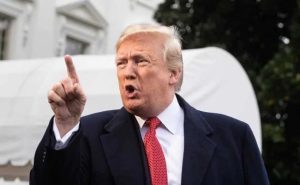Donald Trump and CBS have once again spat, with Trump criticizing the network of dishonesty in its portrayal of Vice President Kamala Harris’ 60 Minutes interview. The dispute has gotten more heated since October 2024, when Trump and his followers started accusing CBS of unjustly favoring Harris in the segment’s editing, implying the network was trying to sway the presidential contest. Despite the unedited interview being made public by CBS and a lawsuit seeking clarification, Trump has insisted that the matter is a serious issue.

The uproar started when the 60 Minutes interview with Harris aired in October. Trump and his supporters swiftly charged that the network had edited the video in a way that favored Harris, claiming that CBS had deleted or changed some of Harris’ most hurtful comments. Trump claimed the network falsely portrayed the vice president and her campaign by substituting more polished, upbeat comments for these remarks. Trump took things a step further on his Truth Social platform, claiming that these alterations constituted to political tampering and so propelled Harris’ campaign ahead of the November 2024 election.
Even though Trump defeated Harris in the election, the former president maintains that CBS’ actions influenced the result of the contest. Trump has called for severe repercussions for the network, such as eliminating the venerable 60 Minutes show and canceling CBS’ broadcasting license. He says the network’s actions are an intentional attempt to sway voters and compromise the fairness of the election process.
CBS responded to the allegations by taking legal action to resolve the issues. As is common in the broadcast industry, the network claimed that any changes were made only for time and released the entire, unedited video of the interview. CBS further said that there was no purpose to misrepresent the interview’s content and that the editing was apparent. In order to accommodate the program’s time slot, the network made it clear that their editorial choices were entirely practical.
But Trump and his followers have stuck to their guns, saying that CBS’ actions are far from normal editing practices. Trump proceeded to express his outrage on Truth Social, describing the situation as a massive scandal that required the highest levels of government to handle. Even though Harris lost the race, the former president again reaffirmed his accusation that CBS was trying to rig the results.
Additionally, the interview scandal touches on more general issues of government oversight and media bias. Trump has long made it clear that he thinks major media organizations, such as CBS, are liberal and support Democratic politicians. He has linked this particular problem to more general conspiracy theories regarding how federal funding affects media coverage. Government organizations may be giving media outlets financial incentives, which in turn affects how they report political events, according to Trump and his followers. However, experts have refuted these allegations, and there is no solid proof to back up the idea that federal financing has a direct influence on the editorial choices made by media outlets like CBS.
Notwithstanding these assertions, analysts note that the Federal Communications Commission (FCC), which is in charge of regulating broadcasting, lacks the power to cancel a network’s license because of editorial choices. According to legal experts, the FCC’s primary responsibility is to oversee technical aspects of broadcasting, like signal interference and license requirements, rather than editorial or content standards. Trump’s demands that CBS’ license be revoked are therefore extremely improbable, and legal experts have warned that any attempt to take legal action against CBS on the basis of these claims would not be acceptable.
On the other hand, the circumstance has raised questions about possible political ploys. Some others think that if Trump demands action against CBS, Brendan Carr, the FCC chairman he nominated, who has a conservative view of media regulation, would be prompted to look into the network. However, even in that scenario, experts believe that if the FCC tried to punish CBS or any other network for alleged media bias, it would be confronted with formidable legal obstacles.
Both Trump and CBS are firmly rooted in their viewpoints as the discussion heats up. It seems that CBS made the decision to make the entire, uncut interview public in order to diffuse the uproar and show openness. Trump continues to accuse the network of electoral tampering, regardless of the outcome of the election, while the network maintains that its actions were in accordance with journalistic standards.
The wider ramifications of this incident are probably going to go much beyond the Harris interview itself. The broader discourse over media bias and the function of journalism in influencing public opinion, especially during elections, is reinforced by Trump’s charges of media manipulation. As the former president’s demands for action gain momentum, legal experts and media watchdogs are closely monitoring whether these calls could spark new political or regulatory conflicts over media freedom.
The future of CBS’s relationship with the Trump administration is still up in the air. This scandal is likely to stay in the public view and feed discussions about the role and influence of the media in American politics, especially since Trump’s legal team and FCC Chairman Brendan Carr may request investigations or other action. CBS, meanwhile, believes that it acted within the parameters of accepted journalistic norms and defends its editorial decisions.
Many in the media and political spheres will continue to keep a careful eye on this ongoing drama, wondering if the government should regulate media coverage and whether this specific debate will have long-term effects on American journalism.
